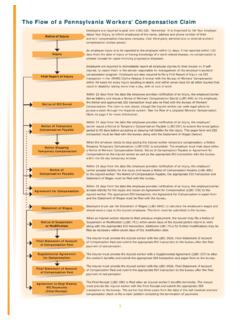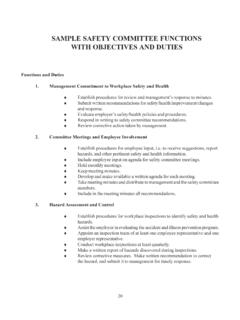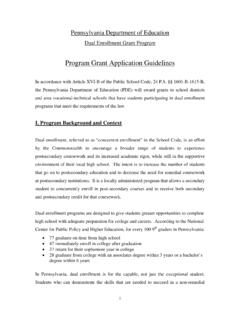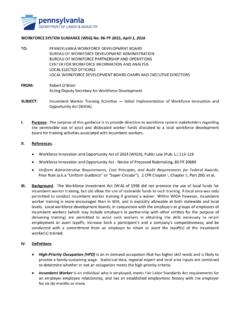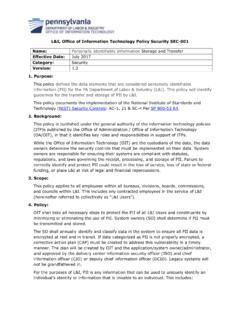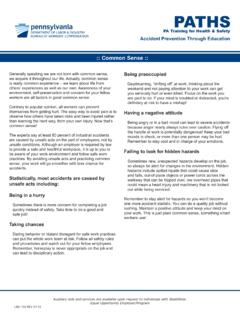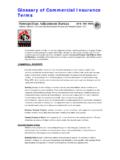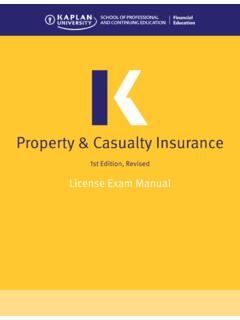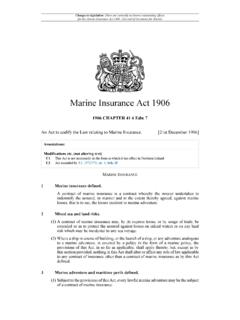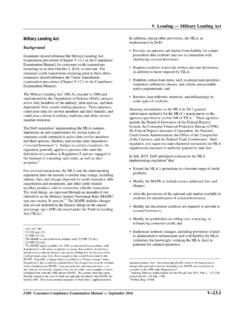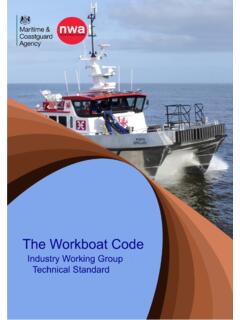Transcription of Propane and Liquefied Petroleum Gas Regulations
1 Propane and Liquefied Petroleum Gas RegulationsCHAPTER 13. Propane AND Liquefied Petroleum GASS ubchapter A. Liquefied Petroleum GASGENERAL PROVISIONS following words and terms , when used in this subchapter, have the following meanings, unless thecontext clearly indicates otherwise: ASME-The American Society of Mechanical Engineers, Three Park Avenue, New York, New York, 10016-5990 or its current address. ASME Code-''The Boiler and Pressure Vessel Code,'' as adopted under the Boiler and Unfired PressureVessel Law, and any published cases and interpretations adopted by the Industrial Board under (relating to adoption of National standards). Act-The Propane and Liquefied Petroleum Gas Act (35 P. S. ). Authorized attendant-An employee of a manufacturer, distributor or user of LPG who was trained, in amanner approved by the Department, in the proper performance of duties and who was officially recognizedby the LPG facility operator to perform those duties.
2 Boiler and Unfired Pressure Vessel Law-35 P. S. Bulk plant-i. An LPG storage facility which has the primary purpose of distribution of LPG and which has: A. A bulk storage capacity of more than 2,000 gallons. B. Container-filling or tank-loading facilities on the premises. ii. The term includes a consumer of LPG that uses storage tanks to refill the consumer's own containersif the consumer's storage LPG facility has a bulk storage capacity of less than 2,000 gallons and thestorage tanks are not owned by a Employee Training Program-The ''Certified Employee Training Program,'' available from thePropane Education and Research Council, 1140 Connecticut Ave. NW, Suite 1075, Washington, DC 20036or its current address. Container-A vessel such as a cylinder, a tank, a portable tank and a cargo tank used for the transporting orstoring of LPG. Cylinder-A container constructed in accordance with United States Department of Transportationregulations, 49 CFR Part 178, Subpart C (relating to specifications for cylinders).
3 Cylinder exchange cabinets-A lockable and ventilated metal locker or rack for the storage of LPG cylindersthat prevents tampering with valves and pilferage to the cylinders. Department-The Department of Labor and Industry of the Commonwealth. Dispensing station-Fixed equipment with an aggregate of 2,000 or less gallons of water capacity whereLPG is stored and dispensed into portable containers. Distributor-i. A person authorized by the Department to sell or transfer LPG. ii. The term includes the owner of a cylinder exchange cabinet or a dispensing positioning system. Gallons-The term shall be measured in terms of water capacity. Industrial Board-The Industrial Board of the Department established under sections 445 and 2214 of TheAdministrative Code of 1929 (71 P. S. 155 and 574), which hears requests for variances and extensionsof time and appeals of Department interpretations regarding LPG matters.
4 Industrial user-A person who is the consumer of LPG and who maintains a total storage capacity at a siteof more than 2,000 gallons and whose storage tanks are not registered under a distributor. This consumermay be a residential or a commercial location. LPG- Liquefied Petroleum gas-A material in liquid form that is composed predominately of any of thefollowing hydrocarbons or their mixtures:i. Propane . ii. Propylene. iii. Normal butane or isobutane. iv. facility-Distributors, bulk plants and industrial users. NFPA-National Fire Protection Association, 1 Batterymarch Park, Quincy, Massachusetts 02269. NFPA 54-The ''National Fuel Gas Code,'' 2009 edition, issued by the NFPA. NFPA 58-The '' Liquefied Petroleum Gas Code,'' 2008 edition, issued by the NFPA. NPGA-National Propane Gas Association, 1150 17th Street, NW, Suite 310, Washington, DC 20036-4523or its current address.
5 National Board-National Board of Boiler and Pressure Vessel Inspectors, 1055 Crupper Avenue, Columbus,Ohio 43229 or its current address. National Board Inspection Code-The ''National Board Inspection Code,'' as adopted under the Boiler andUnfired Pressure Vessel Law, issued by the National Board of Boiler and Pressure Vessel Inspectors. Person-An individual, firm, partnership, unincorporated association, corporation, political subdivision orauthority, including the Commonwealth. Secretary-The Secretary of Labor and Industry of the Commonwealth or an authorized deputy orrepresentative. Tank-A portable or stationary ASME-approved vessel used to store Liquefied Petroleum gas. Transfer-To cause LPG to pass from any pipeline, tank, container, tank truck, receptacle or storage locationto a similar or different type of pipeline, tank, container, tank truck, receptacle or storage location.
6 Chapter applies to:1. The registration and permitting of bulk plants, distributors, industrial users, dispensing stations andcylinder exchange cabinets. 2. The storage, transfer, sale and use of LPG. 3. The design, construction, location, operation and inspection of tanks, cylinders, equipment, piping andappliances used in the handling, storage and use of LPG. 4. The approval of training programs for authorized attendants who transfer LPG. The following fees apply to LPG facility applications, plan approvals, permits and training programcertifications. Fees are nonrefundable. 1. Annual permit and registration fees: i. Bulk plants with the following storage capacities: A. 30,000 gallons or less$ 90 B. 30,001 to 90,000 gallons$135 C. 90,001 gallons or more$180 ii. Industrial users with the following storage capacities: A. 2,001 to 30,000 gallons$ 45 B. 30,001 to 180,000 gallons$ 90 C.
7 180,001 gallons or more$180 iii. Distributors, other than cylinder exchange cabinets, having the following number ofcustomers: A. Less than 1,000$ B. 1,000 to 2,999$235 C. 3,000 to 5,999$ D. 6,000 or more$450 iv. Retail cylinder exchange cabinet location$ 50 (per physical address) 2. Application and plan review, including Fire Safety Analysis review, for new LPG facilitiesexceeding 400,000 gallons and existing LPG facilities expanded to exceed 400,000 gallons intotal capacity $500 3. Application and plan review fee: i. For a LPG facility 4,001 to 400,000 gallons in total capacity$150 ii. For a LPG facility less than 4,001 gallons in total capacity$ 50 4. Duplicate permit fee$ 25 5. Authorized attendant training program approval$200 6. Request for Industrial Board variance, appeals and extensions of time$100 b. The Department will invoice bulk plant owners, industrial users and distributors annually for eachlocation of usage.
8 Payment is due within 30 days of invoice date. Adoption of National The Department adopts the following standards and any of the standards' published cases,interpretations or tentative interim amendments approved by the Industrial Board under this chapterand the act. Other authorities referenced in these standards are adopted if the authority is not excludedin subsection (b): 1. NFPA 54. 2. NFPA 58. b. The Department will not adopt the following NFPA 58 provisions: 1. Chapter 9 (relating to vehicle transportation). 2. Chapter 13 (relating to marine shipping and receiving). c. The following NFPA 58 provisions which will take effect on the enumerated dates: 1. Chapter 5, section regarding the requalification of cylinders filled onsite, effective January1, 2013. 2. Chapter 6, section regarding fire safety analysis for existing installations, effectiveJanuary 1, 2012.
9 3. Chapter 5, section (D) regarding the installation of valves for existing installations,effective January 1, 2018. 4. Chapter 6, section regarding the installation of internal valves for existing installations,effective January 1, 2018. d. The Industrial Board may also approve any NFPA 54 and 58 published cases, interpretations ortentative interim amendments as standards for use under the act and chapter. Provisions enumerated insubsection (b) may not be approved. Registration and annual An operator of an LPG bulk plant, a distributor and an industrial user shall annually register with theDepartment on a registration form provided by the Department. The Department will make thenecessary form available on its web site at b. An applicant for registration shall submit a completed registration form, the annual fee required under (relating to fees) and a valid copy of an industry standard insurance certificate equal to orgreater than the amount of liability insurance required under (relating to insurance ).
10 C. The Department will issue an annual permit. The permit shall be posted at the location of each bulkplant, distributor and industrial user. facilities shall obtain and maintain policies of liability insurance in the following amounts:1. An LPG facility with a storage capacity of not more than 9,000 gallons shall maintain minimumliability coverage of $250,000. 2. An LPG facility with a storage capacity in excess of 9,000 gallons shall maintain minimum liabilitycoverage of $1 million per incident and $2 million in the aggregate. Transfer by authorized attendant and of the following apply to LPG transfer and supply:1. Only authorized attendants may transfer LPG. 2. A distributor may not supply LPG to any bulk plant, industrial user or other distributor unless thedistributor has a current annual permit. Transfer of LPG and removal of (a) A person may not transfer, sell, fill, deliver or permit to be delivered any LPG or use an LPGcontainer unless authorized to do so by the owner of the LPG container and authorized by theDepartment to do so or authorized to do so by emergency response agencies.


